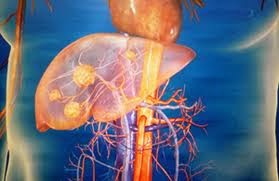Although several risk
factors for hepatocellular cancer are known , exactly how these may lead normal
liver cells to become cancerous is only partially understood.
.jpg) Cancers develop when
the DNA of cells is damaged. DNA is the chemical in each of our cells that
makes up our genes – the
instructions for how our cells function. We usually look like our parents
because they are the source of our DNA. But DNA affects more than how we look.
Some genes have instructions for controlling when cells grow, divide into new
cells, and die. Genes that help cells grow and divide are called oncogenes. Genes that slow down cell
division or cause cells to die at the right time are called tumor suppressor genes. Cancers can
be caused by DNA changes that turn on oncogenes or turn off tumor suppressor
genes. Several different genes usually need to have changes for a cell to
become cancerous.
Cancers develop when
the DNA of cells is damaged. DNA is the chemical in each of our cells that
makes up our genes – the
instructions for how our cells function. We usually look like our parents
because they are the source of our DNA. But DNA affects more than how we look.
Some genes have instructions for controlling when cells grow, divide into new
cells, and die. Genes that help cells grow and divide are called oncogenes. Genes that slow down cell
division or cause cells to die at the right time are called tumor suppressor genes. Cancers can
be caused by DNA changes that turn on oncogenes or turn off tumor suppressor
genes. Several different genes usually need to have changes for a cell to
become cancerous.
Certain chemicals
that cause liver cancer, such as aflatoxins, are known to damage the DNA in
liver cells. For example, studies have shown that aflatoxins can damage the TP53
tumor suppressor gene, which normally works to prevent cells from growing too
much. Damage to the TP53 gene can lead to increased growth of abnormal
cells and formation of cancers. Infection of liver cells with hepatitis viruses
can also damage DNA. These viruses have their own DNA, which carries
instructions on how to infect cells and produce more viruses. In some patients,
this viral DNA can insert itself into a liver cell's DNA, where it may affect
the cell's genes. But scientists still don't know exactly how this might lead
to cancer.
Although scientists
are starting to understand how liver cancer develops, much more must be learned.
Liver cancer clearly has many different causes, and there are undoubtedly many
different genes involved in its development. It is hoped that a more complete
understanding of how liver cancers develop will help doctors find ways to
better prevent and treat them.
Liver cancersymptoms
 Like many types
of cancer, liver cancer symptoms often do not appear in the early stages. As a
result, liver cancer tends to be diagnosed at a more advanced stage.
Like many types
of cancer, liver cancer symptoms often do not appear in the early stages. As a
result, liver cancer tends to be diagnosed at a more advanced stage.Because there are no widely recommended routine screening tests for liver cancer, people with a family history of the disease or other risk factors should talk with their doctor about steps they can take to monitor or reduce their risk.
When present, common liver cancer symptoms may include:
- Weight loss not associated with changes in
diet.
- Decrease in appetite or a feeling of fullness after a
small meal.
- Nausea and vomiting not associated with other known
conditions.
- General weakness and/or fatigue that is persistent, ongoing
weakness or fatigue.
- Fever that is unrelated to other
conditions.
- Pain occurring in the upper abdomen on
the right side or near the right shoulder blade.
- Enlarged liver (hepatomegaly) felt as a mass under the ribs on
the right side.
- Enlarged spleen felt as a mass under the ribs on
the left side.
- Abdominal swelling (ascites) or bloating in the abdomen can
occur as a mass forms.
- Jaundice, which appears as yellowing of the
skin and eyes. Jaundice occurs when the liver is not functioning properly.
Many of the above mentioned symptoms
are similar to other types of benign liver infections or diseases. In the case
of liver cancer, the symptoms will continue to evolve and worsen as the disease
advances. It is important to see a doctor for an accurate diagnosis if you have
any of the above signs of liver cancer.
In rare cases, other disorders may
develop as a result of liver cancer, especially in the early stages of the
disease. Paraneoplastic syndromes cause symptoms in other parts of the body.
Awareness of these symptoms may help with diagnosing liver cancer.
Some
paraneoplastic syndromes related to liver cancer include:
- Hypercalcemia:
High blood calcium levels
- Hypoglycemia:
Low blood sugar levels
- Erythrocytosis:
High red blood cell count
- Hypercholesterolemia:
High cholesterol levels
- Gynecomastia:
Breast enlargement
- Shrinking of testicles in men
Please scan and email your medical reports to us at care@medworldindia.com and we
shall get you a Free Medical Opinion from India’s Best Doctors.
Call Us
: +91-9811058159
Mail Us
: care@medworldindia.com
No comments:
Post a Comment